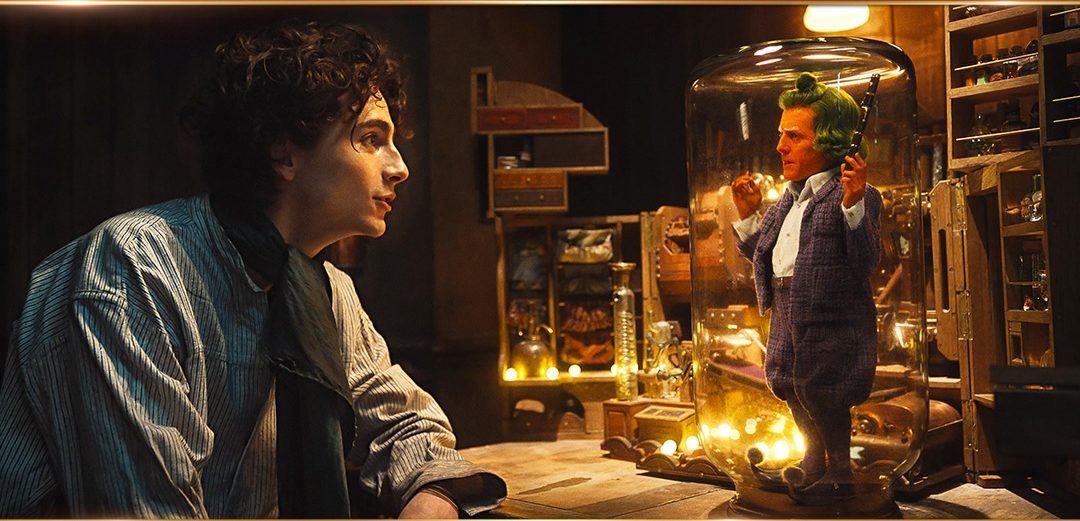
Film Critic Eloise Howell finds Wonka to be a pleasant surprise, praising its strong performances and childlike whimsy
Far exceeding my expectations, Wonka (2024) is a delicious spectacle that delights in providing audiences with an origin story of Roald Dahl’s top-hatted chocolatier. Directed by Paul King, the creative force behind Paddington (2014) Paddington 2 (2017), Wonka contains the same childish charm and feel-good fuzziness.
After travelling around the world for seven years, gathering ingredients and perfecting his recipes, Willy Wonka (Timothée Chalamet) arrives in Europe to set up his chocolate shop in the world-famous Galeries Gourmet. However, after the illiterate Wonka overlooks fine print, he is coerced into forced labour at Mrs Scrubbit’s laundry house where he meets Noodle (Calah Lane) and a group of others, all of whom have fallen victim to Scrubitt (Olivia Coleman) and her right-hand man, Bleacher’s (Tom Davis) conniving trap.
Together, this group forced into partnership by fate orchestrate an elaborate scheme to escape their entrapment, evade a chocolate cartel, and, most importantly, sell chocolate. It is a childish, delectable tale of friendship, chocolate, and hope, injected with Hugh Grant’s hilarious performance as an Oompa Loompa and fun musical sequences.
A childish, delectable tale of friendship, chocolate, and hope
“The greedy win over the needy.” This is what Noodle tells Wonka, and this is what he sets out to unravel. Chalamet’s Wonka possesses an innocent sweetness, a sense of unwavering optimism, lacking the darker, more cynical undertones that underpin Wilder and Depp’s respective portrayals. This leaves me wondering how Willy Wonka, a wide-eyed and optimistic man-child, evolves into the slightly sadistic, reclusive chocolate extraordinaire who turns children into walking blueberries and sends them down garbage chutes.
While the script doesn’t fully allow for some of Scrubbitt’s other victims to be expanded upon, the eclectic group are still endearing. Grant and Coleman deliver hilarious performances, as usual. In her breakout role, Noodle is also exceptional. The chocolate cartel, Arthur Slugworth (Paterson Joseph), Gerald Prodnose (Matt Lucas), Felix Fickelgruber (Matthew Bayton) and their chocolate-addicted chief-of-police puppet (Keegan-Miachel Key) are equally hilarious in a caricaturish way, their sheer malice over chocolate of all things.

One of the most notable aspects of the film that the trailers and marketing successfully obscure is the fact Wonka is a musical. Featuring both new and old songs, the former are largely forgettable. However, the musical sequences that accompany them are exciting, filled to the brim with tightly choreographed dances and escapades through the city.
The film seems to forget it is supposed to be a musical
However, the musical element falls off somewhere around the beginning of the third act and until Chalamet’s rendition of ‘Pure Imagination’, the film seems to forget it is supposed to be a musical. Despite this, the musical sequences and rich set design work in tandem to provide some of the most visually stunning scenes of the film. Dancing through the streets of the European city that appears as a London/Paris/Prague hybrid, flying through a zoo and the Galaries Gourmet, and opening a chocolate shop that resembles any child’s wild fantasy, each frame is decadent and sparkling.
Each scene indulges in the fantasies of adventure and chocolate. King’s influence is undeniable, and the warm fuzziness associated with Paddington is threaded throughout the script. The pacing remains consistent and King and Farnaby never let the story run away from itself.
Verdict:
Notably sweeter than its predecessors, Wonka serves its audience a fizzing delight and, much like Wonka’s chocolates, leaves you feeling satisfied and lighter than you did when you entered the world of the top-hatted chocolatier.
Rating: 8/10
Wonka is in cinemas now.
Enjoyed this review? Check out more on Redbrick Film:
Review: Oppenheimer | Redbrick Film
Review: The Hunger Games: The Ballad of Songbirds and Snakes | Redbrick Film
Comments